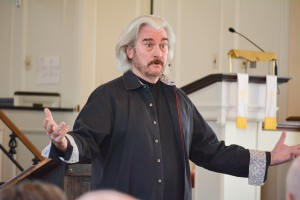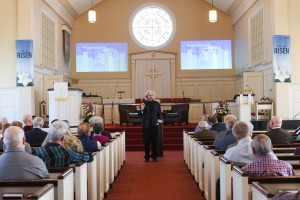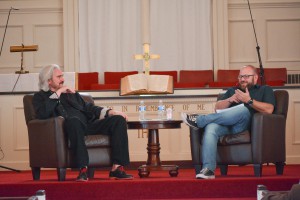Nearly 150 people turned out from across the Synod of the Trinity region in late April to hear Leonard Sweet give his opinions on what the future of the church looks like. Leonard is a best-selling author and professor at Drew University, George Fox University and Tabor College who was twice named “one of the 50 most influential Christians in America.” A Synod Innovation Grant was awarded to Jordan Rimmer, the pastor at Northminster Presbyterian Church in New Castle, PA, where the “Future Church Symposium” was held, to help lay the groundwork for the symposium and bring in a notable speaker like Leonard.
(Mark your calendars: Next year’s Future Church Symposium will be held April 18 and will feature Reggie McNeal.)
What follows are a few reflections from people who attended the Future Church Symposium:
JORDAN RIMMER, Pastor, Northminster Presbyterian Church
This event was a dream of mine. I wanted to have my teacher, mentor and friend Leonard Sweet in my building and share him with my people and my region. I was very happy with the event personally. I felt Len was fantastic — as good as I have seen him. I asked him to be edgy and really push conversations forward, and he did.
Len talked about so many important things, but several stood out to me as critical for the church of the future. We are living in a very different world from where many of our churches come from, and that world is only changing more and more. As Len put it, we might have chosen a different time or a different moment to be the church in the world, but God put us in this moment. Someday when we answer to God for our ministries, it is not going to be enough to tell God that we did not like the moment that God put us in. We need to Carpe Manana — seize tomorrow.
We have to start thinking of ourselves as missionaries to this culture. The first thing a missionary does is learn the language of the culture. We cannot tell this culture that it must learn our language. We are called to learn the language of our culture. The language of our culture today, as Len showed with numerous commercials, is the language of story. The best commercials today do not have lots of words and information about the products. They tell stories, normally with strong symbols and metaphors, and with a good soundtrack.
In the afternoon, Len talked about the five technologies that will shape our future. He spoke of G.R.A.I.N.: Genetic Engineering, Robotics, Artificial Intelligence, Info Technology and Nano Technology. We are living in an increasingly grainy culture, and the church is not ready for it. As people are increasingly robotic (with man-made parts) and genetics allow us to make decisions about our genetic makeup (Google “CRISPR”), how will the church respond? When pastors are asked to marry a human being and a robot (which Len says will happen in many pastor’s lifetimes), how will they respond?
Len said that the older you get, the more you know what you like and the more you can afford to get what you like. He said for pastors to go home and ask your congregation a series of questions. “How many of you have grandchildren? How many of you would do anything for your grandchildren? How many of you would sacrifice a lot of your time for your grandchildren? How many of you would sacrifice a lot of your finances for your grandchildren? How many of you, if you had to, would give your lives for your grandchildren?” Then you get to the tough question: “How many of you love your grandchildren so much that you would sacrifice your musical preferences in church for them?” We must make small sacrifices for our future, and sometimes the smallest sacrifices are the hardest to make.
At the close, Len talked about how important he thinks that Jesus is to the future of the church. When he goes to heaven, the prayer on his lips will be, “Give me Jesus.” The future of the church is not about building the church. It is about pointing to Jesus.
SUSAN FAYE WONDERLAND, Transitional Executive, Synod of the Trinity
 TV commercials tell a story that may or may not be related to the product, but that nonetheless draw us in! Len Sweet began the “Future Church Symposium” with two TV ads that had me from the word “go,” brought tears to my eyes and made me want more.
TV commercials tell a story that may or may not be related to the product, but that nonetheless draw us in! Len Sweet began the “Future Church Symposium” with two TV ads that had me from the word “go,” brought tears to my eyes and made me want more.
It didn’t matter what they were selling; the plot was compelling, and the visuals held my gaze. And here we are, Christians, with the story of God in our hands through scripture, a story that invites us to enter in and tell it as we go. It is a story that comes to life as we tell it and live it, adding our questions, struggles and successes to that story of the living God, made known to us in Jesus. Might we be compelling in our telling?
Good stories are told, read and remembered over and over again. They take root in our lives and we make them our own, using our own language and experiences to help tell them, and so giving them an authenticity that lets listeners know we own them.
The story of God, of Jesus, of the Spirit is not one for us to memorize and recite, but one to learn deeply, integrate, live and retell. Then as we gather our faithful stories together in community, not only do we have the shared tellings of the Old and New Testaments, but we see and learn the work of the living Spirit that is told through us.
Over and over again Len pushed us to value the story that is God’s to us, and our call and challenge to bring this story to current generations. They are already people of story: we see it and hear it in the world around us. Why do we limit the gospel story and leave it on the page rather than releasing it to those in and beyond the church? If Jesus and Resurrection are real, that means we have access to the story that can and will change the world. But it must be told as it is lived!
#astorytolive #astorytoshare
STEVE CURETON, Executive Presbyter, Presbytery of Northumberland
It was a good event and a good day. He (Leonard) had a lot to say and gave us a lot to think about. He followed some of the key ideas of his book which will come out in November and just the premise alone was interesting: what are the volcanoes (religious, political, sociological, anthropological, technological, medical) that can impact us – things in our world and society that can blow up suddenly and change our landscape abruptly, realizing that the ash from such explosions are very fertile. In his book he lists, I think, 34 of them.
Several points hit home for me. The main one was the need for more storytelling in the church. This is a form of communication, heavily used by Jesus, that we should be embracing. Instead, we have replaced it with the lecture, and even designed our sanctuaries to be lecture halls. He pointed to successful TV commercials from around the world to demonstrate the odd but effective idea that many marketing firms choose to sell a product not by talking about the product, but by telling a story and connecting it to the product. (Remember the Clydesdale horse commercials, or the Christmas coffee commercials?) If we want people to understand and relate to the Bible and the truths that come from it, we need to remember that the Bible is a series of stories that need to be told as stories (stories filled with metaphors and given an effective soundtrack). We can lecture about evangelism or we can tell the story of the lost coin.
Back at the Presbytery of Northumberland, we will devote our education time at our March 2020 meeting to the exploration of these ideas. We will use his November released book as our guide. It was a good day and I was very glad I went. Not only did I learn a lot, but I was able to connect with folks I haven’t seen in a while.
STEPHANIE SUMNER, Northminster Presbyterian Church
 I was really happy to have had the opportunity to attend the Future Church Symposium. As a woman with a young family, I, along with my husband, am always thinking about what we can do and change in the church to keep up with the changing world. It was so interesting to get Len Sweet’s take on it all. His insight helped to shape my perspective on the future church and how we can be a better church for Jesus in the present.
I was really happy to have had the opportunity to attend the Future Church Symposium. As a woman with a young family, I, along with my husband, am always thinking about what we can do and change in the church to keep up with the changing world. It was so interesting to get Len Sweet’s take on it all. His insight helped to shape my perspective on the future church and how we can be a better church for Jesus in the present.
There were many impactful takeaways for me. One was Len’s discussion of getting rich in your own locality. He said that Jesus loved a city enough to cry over it, he loved a zip code enough to cry over it; then challenged us… do we love our zip code enough to cry over it?
The other was Len’s discussion of the mandorla – an overlap of two different parts coming together. We’ve seen this almond shape in so many holy scenes and see reference to almonds multiple times in the Bible. We need mandorla churches in the future – bringing in parties of different sides in all aspects of life.
Again, I’m grateful for the wisdom and insight Len shared with us on this day that will impact the way we move forward. Overall, the Future Church Symposium was a great day to learn, grow and meet new people!

